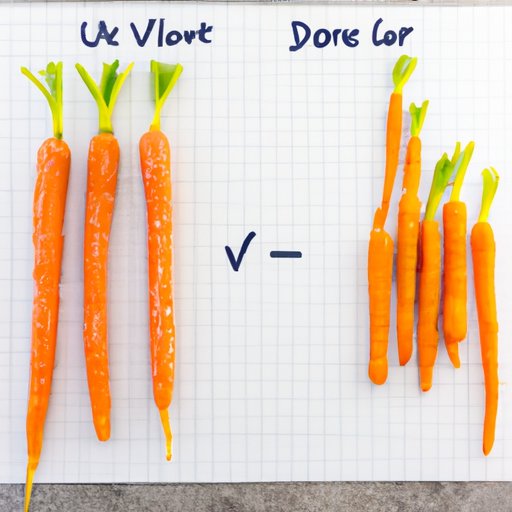Introduction
Baby carrots are small, crunchy carrots that are becoming increasingly popular as a snack food. While they may be convenient and tasty, it is important to consider their nutritional value before including them in your diet. This article explores the potential health benefits and risks associated with eating baby carrots.
Overview of Nutritional Value of Baby Carrots
Baby carrots are an excellent source of vitamins and minerals. They are especially rich in vitamin A, an essential nutrient that helps support vision and immune health. Baby carrots are also high in beta-carotene, an antioxidant that can help protect the body from damage caused by free radicals. Additionally, baby carrots are a good source of dietary fiber, which helps promote regularity and may aid in weight management.
Potential Health Benefits of Eating Baby Carrots
Eating baby carrots regularly can provide several potential health benefits. One of the most notable is improved eye health. The high levels of vitamin A found in baby carrots can help reduce the risk of developing age-related macular degeneration and cataracts. Additionally, the antioxidants found in baby carrots can help protect against cell damage caused by free radicals, which can lead to premature aging and a higher risk of certain diseases.

Risks Associated with Eating Baby Carrots
Although baby carrots offer several potential health benefits, there are some risks associated with eating them. One of the main concerns is pesticide residue. Non-organic baby carrots may contain trace amounts of pesticides that can be harmful if consumed in large quantities. Additionally, baby carrots contain oxalates, which can bind with calcium in the body and form crystals that can cause pain and irritation in the urinary tract.

How to Choose the Best Quality Baby Carrots
When shopping for baby carrots, it is important to choose the best quality available. Organic baby carrots are the best choice, as they have not been treated with chemicals or pesticides. It is also important to look at the color and size of the carrots; they should be bright orange and uniform in size.

Tips for Incorporating Baby Carrots into a Healthy Diet
Once you have chosen the best quality baby carrots, there are several ways to incorporate them into a healthy diet. Baby carrots are great in salads and make a delicious and nutritious snack. They can also be steamed or roasted for a flavorful side dish. Additionally, baby carrots can be pureed and added to soups and sauces for extra nutrition.
Ways to Prepare Baby Carrots for Maximum Nutrition
To get the most out of your baby carrots, it is important to prepare them properly. Peeling the carrots removes a layer of protection that can help retain their nutritional value. Additionally, blanching the carrots for a few minutes in boiling water can help preserve their flavor and nutrients.

Comparing Baby Carrots to Regular Carrots in Terms of Nutritional Value
Baby carrots and regular carrots both offer similar nutritional benefits. Both are an excellent source of vitamin A, beta-carotene, and dietary fiber. However, regular carrots contain slightly more fiber than baby carrots, making them a better choice for those looking to increase their fiber intake.
Conclusion
Baby carrots can be a healthy part of any diet. They are packed with essential vitamins and minerals and offer several potential health benefits. However, it is important to choose organic baby carrots and prepare them properly to avoid potential risks such as pesticide residue and oxalates. Incorporating baby carrots into a balanced diet can help promote overall health and wellbeing.
(Note: Is this article not meeting your expectations? Do you have knowledge or insights to share? Unlock new opportunities and expand your reach by joining our authors team. Click Registration to join us and share your expertise with our readers.)
